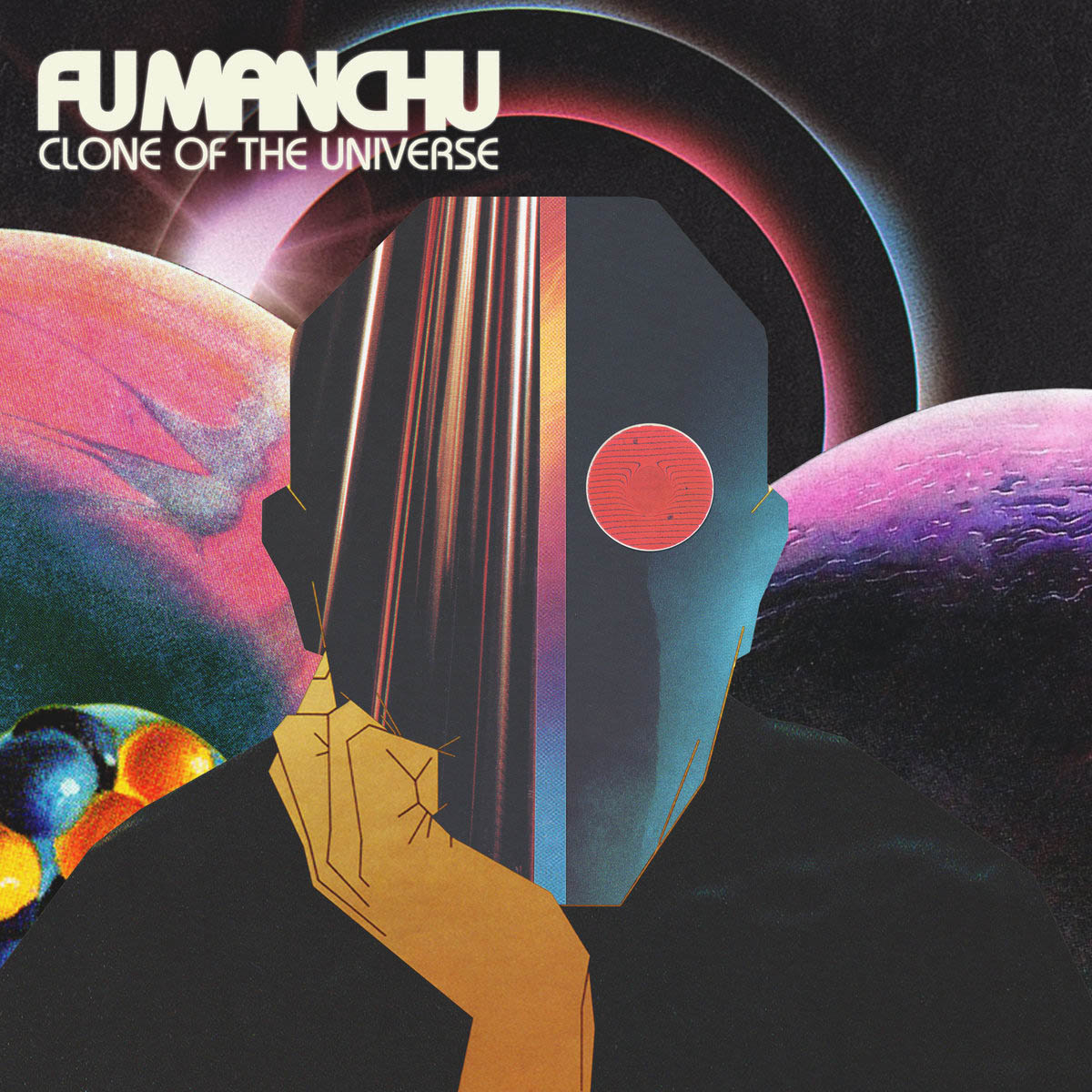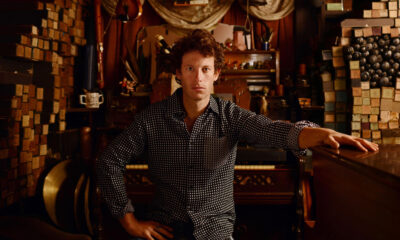Interviews
FU MANCHU Interview; SCOTT HILL Talks About ALEX LIFESON, Riffs, and Musical Longevity
Fu Manchu frontman Scott Hill took some time to chat about the new album, sharing some insights on the new material; what it was like working with Alex Lifeson, living under the moniker of stoner rock, creating riffs and repossessing cars.

A dozen albums in now and the mighty Fu Manchu continue to blaze new terrain within their genre. Their latest album, Clone of the Universe delivers a breath-taking eighteen-minute long orchestration of music entitled “Il Mostro Atomico” that stands amongst their best material. That Alex Lifeson joined them in realizing the song only enhances its cool-factor.
Clone of the Universe was released three weeks ago on Fu Manchu’s own label At The Dojo Records, but for the first time, the band is utilizing New Damage Records for distribution up here in Canada. The band touches down in France today to commence a month-long tour of Europe and then heads out on the road in the US again in May. Look for Canadian dates this coming September!
Fu Manchu frontman Scott Hill took some time to chat with PureGrainAudio about the new album, sharing some insights on the new material; what it was like working with Alex Lifeson, living under the moniker of stoner rock, creating riffs and repossessing cars.
Feeling better? I was supposed to talk to you earlier, and you had a cold.
Scott Hill: Yes, I’d actually lost my entire voice. And we had a couple of local record release shows and I was a little nervous.
How did those shows go? Did they come together OK?
Hill: Yeah, yeah. Like maybe a couple of days before I was worried. I Woke up early in the morning and didn’t really want to say anything – didn’t really want to try your voice. You know, it came back a couple of days later of course. So yeah. The shows went really well.
Cool. How much of the new material did you play at them? Did you play the whole album, or just a few of the songs?
Hill: We did “(I’ve Been) Hexed,” “Nowhere Left To Hide,” “Clone Of the Universe,” and we did “Il Mostro,” the long one. Four of them? Yeah.
Can you tell me how you wound up added to the New Damage roster up here in Canada?
Hill: Oh, um, I think our manager is friends with the owner of the label? And they were talking back and forth and whatever. I dunno. We were going into the studio, and our manager is like “hey, you want to have these guys put it out in Canada?” And We were like “Oh yeah. Totally.” Yeah. So far so good.
Peep Fu Manchu’s “Clone of the Universe” lyric video here.
Nice. Can I assume that there might be some Canadian dates coming up after you wrap everything booked up in May?
Hill: I think September we will be up there. We are doing it starting in Eastern Canada and working our way out west. I think we will be up there for about two weeks trying to play everywhere we can.
Can you tell me if you, Scott, Bob, and Brad have nurtured a kind of preferred writing method – a bit of a shorthand if you will – five albums in now?
Hill: Um, everything starts with a riff. We’ll go to practice and say “Hey check this out.” Play the riff. Usually, it’s our drummer who will come up with four or five different beats and different things for it, and if it sounds cool, we will work on that. If it doesn’t sound good, you know, we’ll try it a bunch of different ways, and if it doesn’t sound good, we’ll put it in the back. Maybe come up with something else. But it always, ever since we started the band in 1990, it just starts with a guitar riff. Every single deal.
You had mentioned the long song on the new album “Il Mostro”, did you approach that as wanting to make an eighteen-minute long epic? Or did you have bits and pieces of songs you were playing with and it sort of gestated into that idea?
Hill: Yeah. I don’t think we’ve ever said “Hey, let’s do an eighteen-minute long song. Everyone will love it.” We wrote about fourteen or fifteen new songs for the record. Usually we do about a ten song record. That’s kind of our limit. So we kind of whittled songs down to ones we really liked. We just coming up with all of these riffs and riffs, and instead of being like full songs to every riff we had, we had this kind of slow riff which is the intro riff to this song, and I was like, “Look. Let’s record all of the good riffs that we have, and put them together and see which ones flow together and let’s just do that as side two of the record.” Everyone was like “Yup. That’s what we’re doing.” We had a lot to chose from, and we thought that was the best arrangement for the song – mixing all of the stuff that we had. It was definitely us having all of these riffs and saying “we can keep making songs. We’ve already got ten that we really like.” And we had to whittle that down to six for side one. It just came out of a bunch of riffs, and we put stuff together so that it flowed well.
Now, that formula did work pretty well for Rush back in the day. So at what point did you entertain the idea of even approaching Alex Lifeson for contributing to it?
Hill: Um, first off I would have never thought that he would have done it. I would never have thought Alex Lifeson would have been on our record. Never ever. Our manager is friends with his manager. They were talking, and it went something like this:
“What’s Alex up to?”
“Oh, you know, he’s in the studio playing guitar.”
“What’s Fu Manchu up to?”
“They are getting ready to go and do the new record. Would Alex ever like to play guitar on Fu Manchu’s record?”
“Let me check.”
He got back and said to send along a demo of the song. So we all said it’s got to be the eighteen-minute long one. It just has to. We sent along a rough version of it and sent it to him and he said he’d listened to it and that he liked it and wanted to know what we wanted to do with it. And we were just like “Whaaaat? Is this a joke? Is this real?” We just couldn’t believe it. It was like “Oh my God, Alex Lifeson is asking us what to do. What the hell?” So we went into the studio and recorded it and then sent it up to him and he just laid guitar all over the place on it. And said “Hey, use whatever you want. However much you want. However little you want. Do whatever you want with it.” It fit perfect in this section where we all kind of drop out and he just made this rhythm. He made it up himself and then kept going with it. Did all of this cool Sci-fi type feedback and a couple of pick-slides in there and we were feeling like it fits perfect. So we’re very excited.
Awesome. Do you think there’s a chance that you will get the opportunity to perform it together in the next year or two?
Hill: Oh God. If he ever… anywhere, anytime. If he was to show up at a show, and we got word that he wanted to play, we would stop what we were doing and get him a guitar and play that song immediately. Or whatever he wanted to do. If he wanted to play drums, get him on the kit. You know, whatever! I don’t know. We’ll see. Hopefully, man.

It’s pretty awesome that it happened. I can only imagine what that felt like for you guys.
Hill: Oh, totally. Even when we got the OK, we still were like “Nah. He’s not going to do it. There’s no way he’s going to do it.” Until we finally got the tracks back and we all said: “Holy shit, he did it.” We were very excited.
So tell me about these other songs you’ve had to whittle down. You’ve probably got almost another album in the can if you had to pare it back that much.
Hill: Yeah. We do. We actually have – hmm, we came up with about 15 songs – completed that we really liked. Then we did our norm and whittled it down to ten songs. Songs that we were going to want to play every night. One of these songs or three or four every night. Then we did the eighteen-minute long song, and we went “Holy crap, now we’ve got to whittle it down to six.” So yeah, we’ve got about six or seven that we really like. And then there is even some newer stuff that we have. So yeah. We’ve got a lot of stuff. Usually when we do that we record everything onto cassette before we track. Then we have it on tape, and we put it away, and we won’t play that stuff, and when it comes time to do a record, we’ll pull it back out and then listen to the stuff and see if we still like it. We’ve done that before and then out of four or five songs we’ve liked three or four of them enough. So we’ve got a lot of stuff to record if we need to.
It’s good that “Il Mostro” is as good as it is. Because if you are going to play it live, it’s going to snooker four or five back-catalog songs, if you will, that could have been played live in your performance. So it’s great that it’s there and that you guys are going to do it, but is it going to truncate certain songs that you guys have been playing as staples in your sets as you tour it?
Hill: Um, you know, we did think about that. We did talk about that. Uh, we usually do about an hour and fifteen minutes when we play. So I think the other night we did like thirteen and that song.
Oh, OK. That’s healthy.
Hill: Yeah. We still do a lot of songs. And we’ll come back out. If you want to hear more, we will come back out and play other old ones. So, we did say let’s see how it goes. If people are bumming out on it, maybe we’ll only play it certain times. But everyone loved it and wanted to hear it. Everyone was yelling for it. Yeah, I hope people like it when we play it. ‘Cause it’s about an eighteen-minute long song. I think there are enough parts in it, and it goes in different directions and stuff to keep your attention. We do play a bunch of other stuff too.
It does feel like four movements too. It’s not that it’s an eighteen-minute long dirge. it progresses, so it does feel like it’s broken into pieces.
Hill: Yeah. We didn’t necessarily have it be like four different sections. That’s just kind of how it worked. I think once we play one part people will be ready for it go into another direction. We can stop the drums, and the bass will come in. And guitar. So I think there is enough to keep their attention. Hopefully. We’ll see.
Would you say that writing music gets any easier as you get older, Scott?
Hill: It’s the same. It’s, like, I just picked my guitar up this morning and was playing and I recorded a riff I had. So, I always have my stuff out. My guitars, my pedals, my amps. I pass by one of my rooms in my house, and I just pick it up and start playing. It’s always the same thing. I’ve never sat down and said: “Gah, I’ve got to write a song.” I don’t think I’ve ever done that. So, it’s been the same, you know? I started in a hardcore band in ‘85. And even then it’s like it starts with a riff. To me, it’s just playing guitar.
Much like us, you’ll be saying “I’ve Been Hexed” by the band’s single of the same name.
Are you OK with the classification of Fu Manchu’s music as stoner rock? I know a lot of musicians don’t like any pigeonholing, so I’m curious.
Hill: Uh, you know what? We don’t care. Call it whatever. We don’t care. I don’t think it is. When I think of the term stoner rock… When I first heard it, it was like 1994. I remember interviewing with somebody, and they had mentioned it. I’d never heard it before. That just brings to my mind Grateful Dead and that type of jammy stuff which I hate. So, I was always like “Eh, I’m not the biggest fan of that term.” But whatever. It’s cool. I can see why people would say that and stuff. The fuzzy guitar and some of the jammy stuff, maybe some of the artwork and titles. It’s cool. Whatever. We’re fine with it. It doesn’t matter, really.
How different are these songs on the album when you compare them with the demo versions that you brought in and were working with as stems?
Hill: Uh, they are pretty close. I think they are pretty close. Usually, like I said, we will record on four-track cassette and we’ll live with that for a bit. Then I’ll start writing the words to it. Uh, what song was different? I think… there’s a song called “Slower Than Light” where at the end of the song we all stop and the bass starts playing faster and the song picks up and it goes through that riff fast. And I think on the demo version it stopped, and I just did it on guitar, and then we just played out the rest of the song. But I remember we were sitting in a room getting ready to record it, and Brad was just playing that part on bass, and I went “Hey, why don’t we have the guitar stop and then you do that on bass. It sounds really cool.” Sometimes, you know, we never tried that until a minute before we were to record the song and have the bass do it. I thought it sounded cool. So we did it, and there you go. You know, sometimes they change. But mostly they’re done when we do them, demo-wise before we go in to record.
Given your longevity in the music industry, can you talk a little bit about making music in this modern era? Are you amazed by certain things? Are you confused by them?
Hill: Oh, I’m always confused. Always. (laughs) I get confused when I walk out the door. I don’t know what’s going on. Uh, yeah, you know, it’s good. I mean, you can go into the studio and record it. We press all of our stuff ourselves on vinyl and CD, and we sell it that way. But it’s also like maybe somebody in Australia who maybe can’t buy a record, and it’s so expensive so they can maybe buy the download for like five-six bucks. So that to me is cool – we can reach a lot of people we wouldn’t be able to reach without the internet. But it’s also bad when people take the record and put it up for free. That’s not great. But, you know, you’ve kind of got to roll with everything good and bad.
If you were eighteen years old right now, would you still pursue being a musician and being in a band?
Hill: Um, yes I would. I never thought I’d still be in a band at this age. I mean, I started when I was eighteen. And I had no idea I’d still be playing. But it’s just too fun. You get back from a month long tour in Europe, and you feel like “Ah, Jesus, I don’t even want to look at my guitar.” And then a week later I’m picking up my guitar and saying “Let’s go. Let’s head back out.” So yeah, I would definitely. Would I do stuff different? Maybe. I dunno. Who’s to say? I think I would still be wanting to play.
Are you or any of your band-mates active on social media at all?
Hill: Um, yeah. We run an Instagram. The Facebook thing. And we have our own personal thing. So we just do all of our own stuff and the band stuff. Bob teaches guitar online. Brad makes fuzz pedals. Our drummer does drum lessons. So everyone has stuff to do online. Bob does Skype lessons all over the world. He’s definitely online. Same with Brad. So he’s selling pedals all over the world. Everyone is on.
Listen to the band’s older single “Tilt” right here.
If the music thing didn’t work out for you, when you were eighteen years old, did you have a backup plan? Were you like scholarly in anything else?
Hill: Scholarly? (laughs) I used to own a repossession company where we repossessed cars. And I did that up until probably 1997. And we had release our The Action Is Go record, and our label was like “Hey, we’ve got all of these tours set up.” It was like ten months of touring, and I was like “Holy crap!”. It made me think that if I really wanted to do this, touring is the way to go. I’ve got to do that. I finally sold my repossession business. No regrets at all. I dunno what. I really don’t. I’m not sure.
What’s your favourite piece of Fu Manchu merchandise or memorabilia from the past albums?
Hill: Oh, uh, we had these surfboard bottle openers that I really liked. Shaped like a surfboard and we had a keychain bottle opener – I really liked those. The shirts are cool. I’ve always liked band shirts. We always make silk-screened posters for touring. Do a limited amount and sell them to people. As long as stuff sells and it’s gone, I’m good with all of it.
Do you still go out and see live music?
Hill: Oh yeah. Any chance I get. Probably not as much as I used to. But yeah, I do. I definitely go out and see what I can.
Is there a band that you’ve seen recently that you were impressed with?
Hill: I just saw Quicksand a few months ago. I thought they were really good. I think that’s the last band I saw.
A good band to see. I think the last time I saw Fu Manchu was Orion Festival in Detroit. That’s got to be five years ago? Maybe six?
Hill: Oh yeah. The Metallica thing. Yeah. That was a while ago.
I don’t know if you’ve come up through Canada since then. I would have gone. Unless I had a conflict or something.
Hill: You know, I think we have. Vancouver a few times. I think we did play Toronto at least once since then. I can’t remember what record that was for. I know we were up there. But we are planning to get back up there in September.
Cool. Well, the potential for an Alex appearance in Toronto is higher than most.
Hill: Oh, cross your fingers.
-

 Music4 days ago
Music4 days agoTake That (w/ Olly Murs) Kick Off Four-Night Leeds Stint with Hit-Laden Spectacular [Photos]
-

 Alternative/Rock5 days ago
Alternative/Rock5 days agoThe V13 Fix #010 w/ High on Fire, NOFX, My Dying Bride and more
-

 Hardcore/Punk2 weeks ago
Hardcore/Punk2 weeks agoHastings Beat Punks Kid Kapichi Vent Their Frustrations at Leeds Beckett University [Photos]
-

 Culture2 weeks ago
Culture2 weeks agoCirque Du Soleil OVO Takes Leeds Fans on a Unique, Unforgettable Journey [Photos]
-

 Alternative/Rock2 weeks ago
Alternative/Rock2 weeks agoA Rejuvenated Dream State are ‘Still Dreaming’ as They Bounce Into Manchester YES [Photos]
-

 Features4 days ago
Features4 days agoTour Diary: Gen & The Degenerates Party Their Way Across America
-

 Culture7 days ago
Culture7 days agoDan Carter & George Miller Chat Foodinati Live, Heavy Metal Charities and Pre-Gig Meals
-

 Music6 days ago
Music6 days agoReclusive Producer Stumbleine Premieres Beat-Driven New Single “Cinderhaze”













